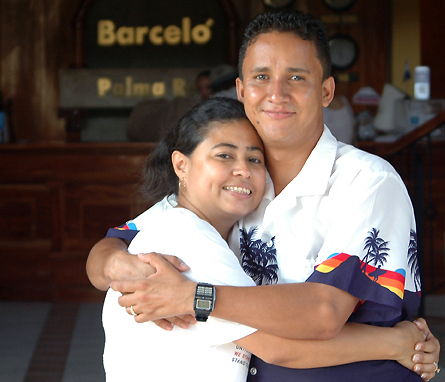Signs of love (Señas de amor)
While flipping through pages of a wedding album, Nancy Pfanner pauses to identify people and describe friendships she's cultivated through her numerous visits to Honduras. She stops at a picture she took of a bride and groom exchanging vows using Lesho -- Honduran sign language.
It's an ordinary snapshot, except for one important detail -- it shows a couple that, a few years ago, had no language at all.
"I was thinking, 'This is amazing,'" says Pfanner, a full-time American Sign Language lecturer in Baylor's communication sciences and disorders department since 2000. "In Honduras, deaf people usually do not get married because of the social stigma."
A Central American country with a population of almost 7 million, Honduras is home to nearly 70,000 deaf, many of whom are ignored or abused in rural parts of the country, she says. "If there's a doctor in the village, they won't bring [out] their deaf or disabled kids. They'll keep them in the house," she says.
Pfanner's connection to the world of deaf Hondurans was forged in 2001 when she met American missionary Robin Hanna, who independently founded a ministry there for the deaf three years earlier. The not-for-profit organization, called Signs of Love, gives the power of language to the deaf through sign language and literacy classes.
Mario and Patricia Ant'nez, the newlyweds in the photograph, once communicated only through rudimentary gestures, but after four years of intensive study of Lesho at Signs of Love, both now are leaders in the ministry, and Mario is pastor of a church for the deaf, Pfanner says. "The deaf are taking over more and more aspects in the ministry," she says. "That's the goal."
But for now, there still is work to be done, and that's why Pfanner has teamed up with University Ministries at Baylor for the past three summers to offer mission trips to Honduras for students in ASL courses; through 2004, 29 students have participated.
Opportunities like these -- in which the students are able to put into action what they are taught -- give them a broader vision for future vocations. "There are a lot of goals I have for the students -- their spiritual development, their view of the world and learning about other peoples and languages," she says.
Last summer, two teams went to Honduras. One was led by ASL senior lecturer Lori Wrzesinski, who took seven students to the capital city of Tegucigalpa, where they worked in the country's first Christian school for the deaf. Pfanner led the second group, which included six current Baylor students and one recent graduate, to La Ceiba, home base for Signs of Love. There, the team helped run a camp for deaf children, youth and young adults. Through craft, drama and recreation sessions, participants were able to start learning Lesho, their own "heart language," she says.
The task has been simplified by the introduction of a Lesho dictionary, which Pfanner says the group distributed "like candy" to the deaf community and those with learning and language disabilities. Entries in the dictionary are arranged categorically, not alphabetically, and include the Lesho sign, the word translated in Spanish and an illustration drawn by a deaf Honduran.
Funded by a Rotary International grant, the dictionary's development was a joint project of Pfanner and members of the Signs of Love ministry. When visiting Honduras, Pfanner videotaped the deaf using Lesho, noting the signs they used for certain words. On each subsequent visit, though, she saw that some of the signs had changed -- evidence of a dynamic language.
"As the deaf came together, they said, 'I don't like that sign. We're going to use this sign,'" she says. Such evolution made compiling a dictionary challenging, but it was a source of pleasure for Pfanner and the others. "They developed the language and are developing it as we speak," she says. "Why I'm so proud of being part of this is when you validate a language, you validate a people."
Working with Honduras' deaf community "captures your heart," Pfanner says, but it also can be emotionally wrenching for the program's participants. "We cry every day -- the injustices, the abuse, the sad stories," she says. "'It's not fair.' We have that conversation every single night." But then, "We talk about what we can do to make a difference in their lives."
Jennifer Miller, BA '03, took her former professor's words to heart when she returned from her trip in summer 2003. After graduating in December, Miller moved to Honduras to work with Signs of Love, spending much of her time piloting a literacy program created by Pfanner. "I sent [Jennifer] with a strategy and materials," Pfanner says, "and then she e-mails me back and says, 'Well, that one didn't work.'"
The work is fulfilling, despite setbacks, says Miller, who stayed in Honduras for six months and plans to return to work full time with Signs of Love in January, after raising financial support. "The deaf here are amazing, and they want to learn to read so badly," Miller says. "Even though we have had our share of frustrations during this project, we smile through them."
The lessons for teachers and students are powerful, Pfanner says. "A lot of times we, as wealthy Americans, go into a situation thinking, 'I'm going to be blessing these people with my great ... whatever.' But every time I go, I am so much more blessed. What I give to the people of Honduras is this much," she says, pinching her fingers together as if she's holding a grain of rice, "compared to what I have learned and seen. So, who's the missionary? Who is doing the real mission? Is it me or is it them? And every [student] comes back with that same feeling."
To find out more about Signs of love, visit its Web site, www.signsoflove.org.
